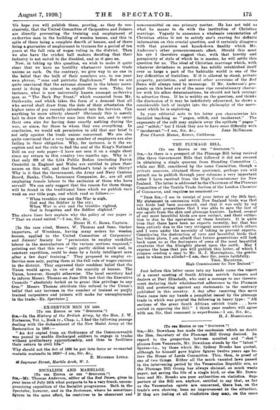THE PLUMAGE BILL.
[To THE EDITOR OF THE "SPECTATOR.") SIR,—As there is a prospect of the Plumage Bill being revived (the three Government Bills that followed it did not succeed in obtaining a single quorum from Standing Committee C, while our Bill, considered by the same Committee, though a private measure, obtained three quorums), perhaps you will permit me to publish through your columns a very important letter I have received from the High Commissioner for New Zealand. The letter is addressed to the Chairman of the Plumage Committee of the Textile Trade Section of the London Chamber of Commerce, and requires no comment :— "DEAR SIR,—I am in receipt of your letter of the 26th inst. My statement in connexion with New Zealand birds was that our birds had been massacred, and that it was only by my taking great precautions that I was able to save the last of our egrets from the skin and plumage hunters. Indeed, several of our most beautiful birds are now extinct, and their extinc- tion is due to the operations of those hunters. It is quite true that there have been no exports recently, but that has been entirely due to the very stringent measures which others and I were under the necessity of taking to prevent exports. Considering the destruction of rare and beautiful birds that has taken place, I am afraid that future generations will look back upon us as the destroyers of some of the most beautiful creatures that the Almighty placed upon the earth. May express the hope that you will publish this letter, of which I propose sending a Dopy to Mr. II. J. Maesingham, the gentle- man to whom you allude?—1 am, dear Sir, yours faithfully, Taos. MACKENZIE, High Commissioner for New Zealand."
Just before this letter came into my hands came the report of a recent meeting of South African ostrich farmers and dealers at Port Elizabeth, who sent a message to our Govern- ment declaring their wholehearted adherence to the Plumage Bill and protesting against any statements to the contrary published in this country. A day after receiving this news there came into my hands a pamphlet issued by the plumage trade in which was printed the following in heavy type: "AU sections of the great South African ostrich trade . . . have united in opposing the Bill." I think your readers will agree with me, Sir, that comment is superfluous.—I am, Sir, &c.,
H. J. MAINUNGEIAM.


































 Previous page
Previous page